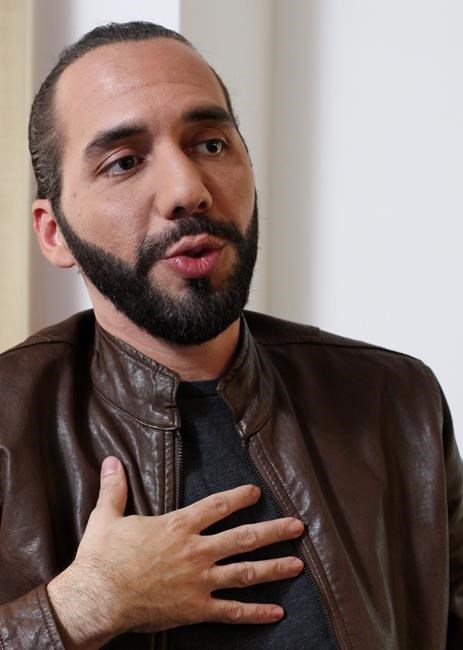
Salvadoran President-elect Nayib Bukele, speaks during an interview with The Associated Press in San Salvador, El Salvador, Tuesday, Feb. 12, 2019. Bukele, a youthful former mayor of the capital, easily won El Salvador's presidency, getting more votes than his three rivals combined to usher out the two parties that dominated politics for a quarter century in the crime-plagued Central America nation. (AP Photo/Salvador Melendez)
February 13, 2019 - 2:01 PM
SAN SALVADOR, El Salvador - El Salvador's president-elect says he will make improving relations with the United States a priority, in part to try to avoid Washington forcing tens of thousands of Salvadorans now living in the U.S. to return home.
The 37-year-old Nayib Bukele easily won the presidency early this month in the first round of voting, breaking a three-decade hold on that office by the Central American country's two dominant parties.
Wearing his usual jeans and leather jacket, Bukele told The Associated Press in an interview that poor relations with the U.S. are one of the mistakes of the outgoing administration that he plans to correct after taking office June 1.
Nearly 200,000 Salvadorans have lived in the United States for years under temporary protected status, a renewable designation that allows them to live and work legally in the U.S. They are a fraction of all the Salvadorans living in the U.S., a total estimated to be around 2.5 million.
Last year, the Trump administration announced it was ending temporary protected status, known as TPS, for citizens of El Salvador and several other countries. But in October, a federal judge in San Francisco temporarily blocked ending the status for four countries, including El Salvador. The injunction remains in effect.
"With people carrying signs saying 'Yankee Go Home' at party events or burning the United States flag, it is very difficult to go and negotiate a way out," Bukele said. "But if we send them the right signals, I believe that we can negotiate a resolution to the common problem we have with TPS."
Bukele recently met with U.S. Ambassador Jean Manes and said he emerged feeling that the two governments can arrive at a "win-win" solution. They also spoke about combatting corruption — a central pillar of Bukele's campaign platform — and decreasing migration through economic development.
"El Salvador needs to be friends with the United States. It is an imperative for us," Bukele said.
Finding friends among his own lawmakers could be more challenging.
Bukele, a former mayor of El Savlador's capital, began in politics with the leftist Farabundo Marti National Liberation Front, the current governing party, but he was expelled for his persistent criticism of its leaders. He was elected president Feb. 3 as the candidate for the conservative Grand Alliance for National Unity, which has only 10 of the 84 seats in the Legislative Assembly.
That means Bukele will need help to get his initiatives passed, but he said he is not interested in making deals in the way politics has worked for years. That is what voters wanted to eradicate when they elected him, he said.
"I believe that the way politics has been done in the country is wrong," he said. "It has always been based on alliances that don't have the well-being of the people as their first priority."
"They make alliances in the (Legislative Assembly) based on things that aren't ideological, like money under the table, business, group interests," he said.
Lawmakers will have to decide whether they will vote for initiatives that will be good for the people, Bukele said.
One of those proposals is creating an international commission to investigate corruption, similar to a United Nations-backed effort in Guatemala.
But Bukele conceded there is "scarce political support" for the endeavour in El Salvador. He said that if lawmakers block it, "the people, who are wise, intelligent and informed, are going to say who are those opposed to and blocking the creation."
"The people are going to be able to judge for themselves who is supporting corruption and who is against it," he said.
News from © The Associated Press, 2019